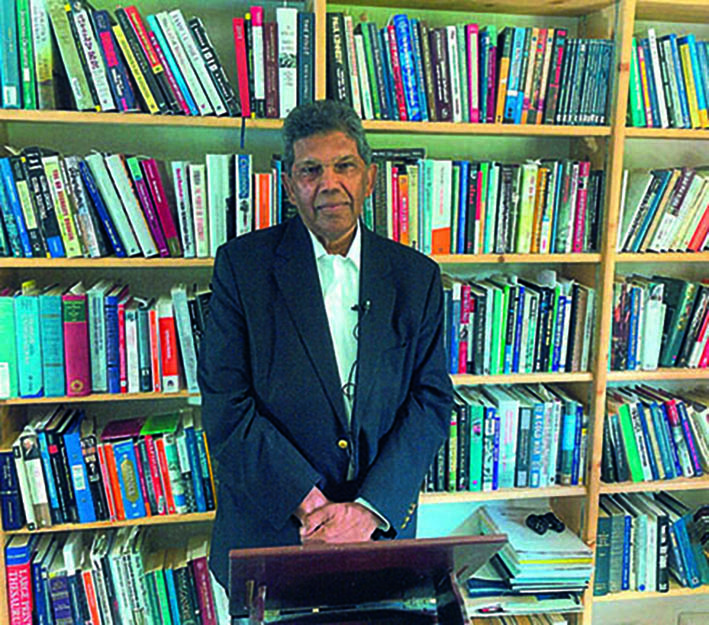By Dr Bertrand Ramcharan
Seventh Chancellor of the University of Guyana
Previously Fellow of the LSE and Fellow of Harvard University
Michele Norris, a highly decorated American journalist, is the founding Director of the Race Card Project. She wanted to understand the attitudes of Americans to race. So she started a project in which she distributed cards with the following written on them: “ Race. Your Story. 6 words. Please send.”
In the fourteen years since Ms Norris first posed this request, more than a million people have submitted their stories to the Race Card Project. Based on the replies she received, Ms Norris has just published “Our Hidden Conversations. What Americans Really Think About Race and Identity” (Simon and Schuster, 2024, 471 pages). It is an enlightening book and a riveting read.
In the presentation of the book, it is written: “The stories are shocking in their depth and candour, spanning the full spectrum of race, ethnicity, identity and class. Even as just six words, they reveal fear, pain, anger, exhaustion, triumph, and sometimes humour. … This unexpected panorama of responses across races, class, religion, and geography provides a rare 360-degree view of how American see themselves and one another.”
It is further written: “Our Hidden Conversations offers an honest, if sometimes uncomfortable, conversation about race, permitting us to eavesdrop on deep-seated thoughts, private discussions, and long-submerged memories. It reminds us that at times of great division, honesty, grace, and a willing ear can build a bridge toward understanding and maybe even empathy.”
As I write this, I have just read a pleading letter in the Stabroek News of 6 March, written by former President Donald Ramotar, a respected friend, commenting on a number of pronouncements on race and politics in Guyana. Putting it neutrally, the central issue is who should be ‘pon top’. On one side, there is the view that former PNC leader L.F.S. Burnham kept Afro-Guyanese ‘pon top’ and that his methods should be emulated. It is overlooked that by overturning the Independence Constitution and bringing in the Executive Presidency, he handed Afro-Guyanese a poisoned chalice and did an historical injustice to them. It is recognition of this phenomenon that has led to calls for re-starting constitutional negotiations from ground zero.
But those who now profit from Burnham’s constitutional legacy are not interested in change. They like enjoying what he brought in – through a rigged referendum, not to mention rigged elections!
On the other side, there is smug satisfaction that the system brought in by Burnham is being enjoyed by the putative heirs of Dr Cheddi Jagan. There are suggestions that Dr Jagan went awry in choosing the wrong side during the Cold War, that he lacked understanding of his Indian culture, that he had not read enough literature as a youth to broaden his mind, and that he lacked understanding of Africans – despite the fact that he attended Howard University in Washington, a predominantly black institution, and that he had deep friendships there with Afro-Americans. I read with feeling the pained recent letter by Dr. Joey Jagan in the Stabroek News protesting against such calumnies against his distinguished father, who had a passionate desire for justice for all.
What is clear is that nearly six decades after Guyana achieved its independence, there is still no unifying vision to which all Guyanese can rally as they face the future together. At the Durban world conference of 2001 against racism and racial discrimination we, in the Office of High Commissioner for Human Rights, invited every country in the world to write and adopt a unifying vision for itself, embracing all parts of the population.
Such a vision statement could be of great help in bringing the Guyanese people together. But it will only take root when we have revised the system of governance so that it does not produce a situation in which any side thinks that they, or the other side, are ‘pon top’. Revision of the constitutional system is crucial, and the issue is in need of serious political analysis that would go beyond the scope of this essay.
But, might we nevertheless benefit from Michele Norris’ approach to the issue of race and identity and from her Race Card Project? Might we start by inviting Guyanese to offer a simple sentence on what they consider to be the essence of the Guyanese identity? And might we publish the offerings received in a book, as Ms Norris has done, to help us see who we are, and how we can go forward together.
Without a doubt, there is much bile in the political classes on the structure and processes of governance. And some of this bile exists within parts of the Guyanese population. Guyanese citizens, whether at home or abroad, could help reduce this by sharing their perspectives on what they consider to be the defining and unifying features of the Guyanese identity.
Please let us consider it. We can benefit from an approach such as Ms Norris’ Race Card Project. Her book makes for riveting and enlightening reading. At a time of great division, “honesty, grace, and a willing ear can build a bridge toward understanding and maybe even empathy.”





